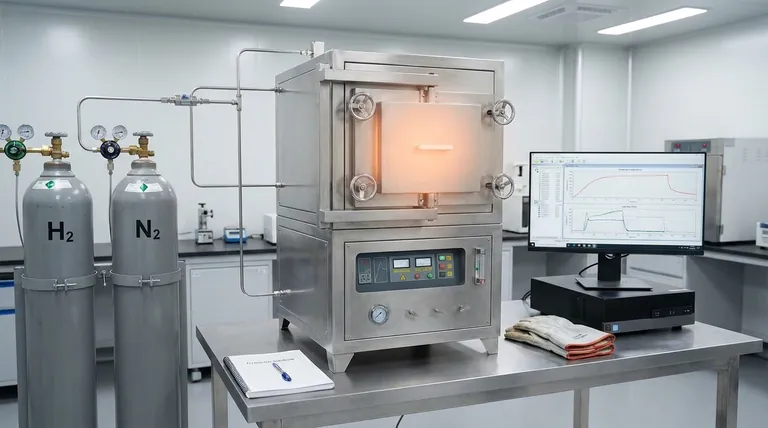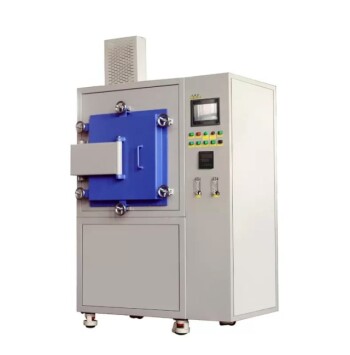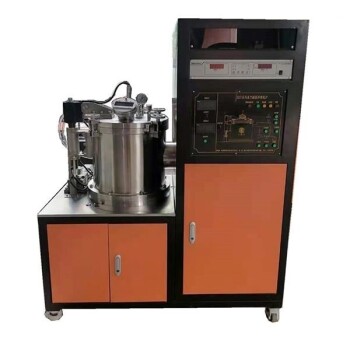In short, hydrogen is used in annealing furnaces for two critical reasons that work in tandem. Its exceptionally high thermal conductivity allows for very rapid and precise heating and cooling, while its chemical properties create a "reducing" atmosphere that actively removes oxygen to prevent oxidation and ensure a clean, bright metal surface.
The core challenge in high-performance annealing is achieving precise metallurgical properties in an absolutely oxygen-free environment. Hydrogen is uniquely suited for this because it not only creates a protective atmosphere but actively purifies it by consuming oxygen, all while offering superior thermal control.

The Dual Role of Hydrogen in Heat Treatment
To understand why hydrogen is chosen over simpler inert gases like argon or nitrogen, we must look at its two distinct functions: chemical protection and thermal efficiency.
A Powerful Reducing Agent to Prevent Oxidation
The primary goal of a protective atmosphere is to prevent the hot metal from reacting with oxygen, which causes scaling and discoloration. Hydrogen takes this a step further.
Instead of just displacing oxygen, hydrogen acts as an active reducing agent. It chemically reacts with any residual oxygen (O₂) or surface oxides present in the furnace to form water vapor (H₂O), which is then flushed out.
This active "scrubbing" process ensures an exceptionally clean, oxygen-free environment, resulting in a bright, pristine finish on the annealed parts. This is critical for applications in electronics, medical devices, and aerospace.
Exceptional Thermal Conductivity for Process Control
Hydrogen's thermal conductivity is significantly higher than that of air or nitrogen. This physical property has a direct impact on the efficiency and precision of the annealing cycle.
Because it transfers heat so effectively, a hydrogen atmosphere allows for faster heating ramp-up and much quicker cooling rates.
This gives engineers precise control over the material's grain structure and final mechanical properties. Faster cycle times also directly translate to higher throughput and operational efficiency in a production environment.
Understanding the Trade-offs and Risks
While hydrogen offers superior performance, its use is not without significant challenges. The decision to use a pure hydrogen atmosphere is a calculated trade-off between performance benefits and operational risks.
The Inherent Risk of Explosion
Hydrogen is highly flammable and forms an explosive mixture with air (oxygen). This is the single greatest concern when operating a hydrogen furnace.
Consequently, these furnaces require specialized, explosion-proof safety provisions, including robust ventilation, gas leak detectors, and carefully managed purging cycles to ensure air is fully removed before hydrogen is introduced.
Material and Logistical Challenges
On a practical level, sourcing and storing large quantities of high-purity hydrogen can be a significant logistical and cost challenge compared to nitrogen.
Furthermore, the reducing atmosphere itself can have unintended side effects. For example, certain metallic heating elements can become brittle over time when operated in a hydrogen environment, reducing their service life.
How to Apply This to Your Process
Choosing the right furnace atmosphere depends entirely on the material, the desired outcome, and your operational constraints.
- If your primary focus is achieving the highest purity and a bright finish: Hydrogen's active reducing properties are essential for removing all traces of surface oxides.
- If your primary focus is rapid cycle times and precise thermal control: Hydrogen's high thermal conductivity offers unmatched heating and cooling efficiency for demanding metallurgical specifications.
- If your primary focus is safety and cost-effectiveness for less sensitive materials: A mixed gas (like a nitrogen-hydrogen blend) or a pure inert gas (like nitrogen or argon) often provides a sufficient balance of protection and lower operational risk.
Ultimately, hydrogen is selected when the metallurgical requirements for purity and thermal precision justify the investment in managing its inherent risks.
Summary Table:
| Key Property | Benefit in Annealing |
|---|---|
| Reducing Agent | Actively removes oxygen, preventing oxidation and ensuring a bright, clean metal finish. |
| High Thermal Conductivity | Enables rapid, uniform heating and cooling for precise process control and faster cycle times. |
Ready to enhance your annealing process with precision and purity?
At KINTEK, we specialize in providing advanced lab equipment and consumables tailored to your laboratory's specific needs. Whether you're working in electronics, aerospace, or medical device manufacturing, our hydrogen annealing solutions deliver the superior thermal control and oxygen-free environment required for high-performance results.
Contact us today to discuss how our expertise can optimize your heat treatment operations and achieve the metallurgical properties you demand.
Visual Guide

Related Products
- 1200℃ Controlled Atmosphere Furnace Nitrogen Inert Atmosphere Furnace
- 1400℃ Controlled Atmosphere Furnace with Nitrogen and Inert Atmosphere
- Controlled Nitrogen Inert Hydrogen Atmosphere Furnace
- Vertical Laboratory Tube Furnace
- 1700℃ Controlled Atmosphere Furnace Nitrogen Inert Atmosphere Furnace
People Also Ask
- How do you make an inert atmosphere? Master Safe, Pure Processes with Inerting
- What is an example of an inert atmosphere? Discover the Best Gas for Your Process
- What is an inert atmosphere heat treatment? Protect Your Metals from Oxidation & Decarburization
- Why nitrogen is used in furnace? A Cost-Effective Shield for High-Temperature Processes
- Can nitrogen gas be heated? Leverage Inert Heat for Precision and Safety



















